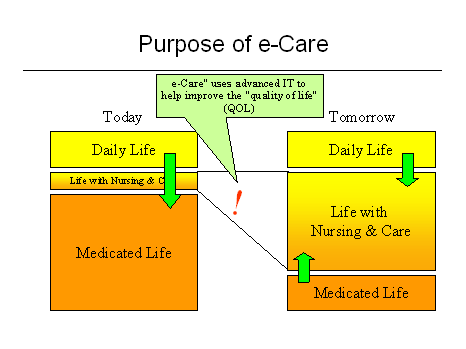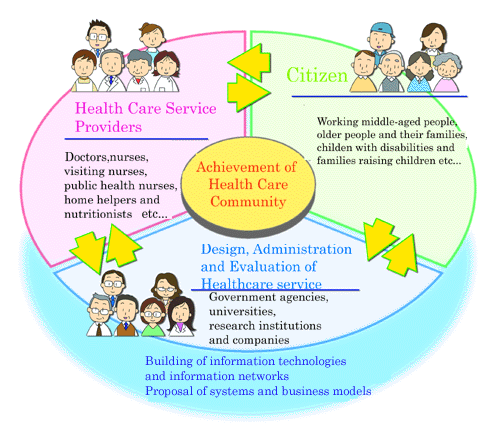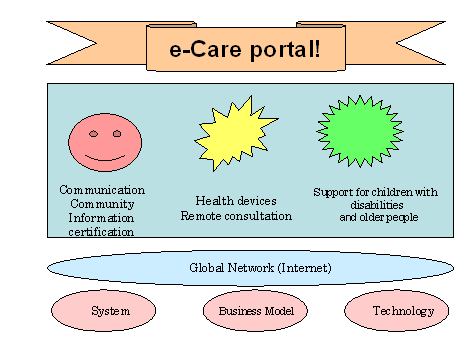e-Care Consortium
* This laboratory has been completed.
The purpose of this consortium is to contribute to society by gathering experts in health care, medical care, nursing, welfare and information technology to create and communicate knowledge and expertise in the field of "e-Care." It will be based on the findings from the "e-Care Town Project."
| Number of participating organizations | 10 |
|---|---|
| Contact |
E-mail:info@e-care-project.jp
|
Background
For two years beginning FY 2002, the Faculty of Nursing and Medical Care at the Shonan Fujisawa Campus (SFC) of Keio University took the lead in conducting the “e-Care Town Project,” a demonstration experiment in the nursing care and welfare field that was part of the “e!Project” (a project designed to show the people of Japan and of the world the image of the world’s most advanced IT nation) conducted by the Ministry of Public Management, Home Affairs, Posts and Telecommunications. The demonstration experiment was run by four organizations: Keio University, the city of Fujisawa, Fujisawa City Health and Medical Foundation and NTT East. It enjoyed the widespread cooperation of the residents and businesses of Fujisawa. The “e-Care Town Project” marked a revolutionary step forward in the fusion of the nursing care and welfare field and advanced IT. As a community-led collaboration among the industry, government and academia, it was widely followed by local governments and interested businesses and achieved two primary results:
- Collaboration with the local government and residents to build a demonstration experiment field
- Confirmation of the potential for social change with the introduction of IT to the nursing care and welfare area.
Outline
“e-Care” uses advanced IT to help improve the “quality of life” (QOL) in many areas, including the health of people of all ages and their sense of community and society. (Figure 1)

Figure 1
Demographic projections indicate that Japanese society will reach the “super-aged society” stage (in which the people aged 65 or older account for 25% of the population) about 2013. At the same time, steady progress continues to be made in computerization, and a wide range of Internet-based information technologies are becoming more accessible. In light of this, the consortium will build horizontal ties between experts and businesses in the areas of nursing, welfare,
medical care, IT and other fields to enable them to exchange and communicate information and propose new social systems, administrative techniques and business models. These activities will help to establish and develop an “e-Care” oriented health care community (“e-Care Town”). (Figure 2)

Figure 2
Topics of inquiry
- Identification of the issues facing the health care field and proposal of IT-based solutions
- Collection and organization of information on “e-Care” (IT-based health care, medical care, nursing and welfare) in Japan and other countries, creation of “e-Care Portal” (Figure 3)

Figure 3 - Proposals for the achievement of “e-Care” and verification of their feasibility
- Communication of “e-Care” research results accumulated by the consortium
Expected results
- Collaboration with the local government, research and verification projects that monitor local residents
- Implementation of joint research and testing with sponsoring companies
- Return to society of “e-Care” demonstration test results
- Creation of an “e-Care Town”
- Communication of the “e-Care Town” model to other communities in Japan and other countries
Researchers, managers and professors
| Kikuko OtaDirector | Dean/Professor, Faculty of Nursing and Medical Care |
|---|---|
| Jun Murai | Dean/Professor, Faculty of Environment and Information Studies |
| Hideyuki Tokuda | Chairperson, Graduate School of Media and Governance Professor, Faculty of Environment and Information Studies |
| Jiro Kokuryo | Dean/Professor, Faculty of Policy Management |
| Masako Kaneko | Professor, Faculty of Nursing and Medical Care |
| Keiko Takenoue | Professor, Faculty of Nursing and Medical Care |
| Masahiro Kobayashi | Professor, Faculty of Nursing and Medical Care |
| Toshiro Otani | Professor, Faculty of Nursing and Medical Care |
| Etsuko Shindo | Associate Professor, Faculty of Nursing and Medical Care |
| Minako Shimegi | Associate Professor, Faculty of Nursing and Medical Care |
| Mika Chaen | Associate Professor, Faculty of Nursing and Medical Care |
| Shoko Miyagawa | Associate Professor, Faculty of Nursing and Medical Care |
| Emiko Yasuda | Associate Professor, Faculty of Nursing and Medical Care |
| Miki Kubo | Research Associate, Faculty of Nursing and Medical Care |
| Emi Kawakita | Research Associate, Faculty of Nursing and Medical Care |
| Yuji Ohgi | Associate Professor, Graduate School of Media and Governance Associate Professor, Faculty of Environment and Information Studies |
| Ryoko Fukuda | Project Assistant Professor, Graduate School of Media and Governance |
| Miki Akiyama | Associate Professor, Faculty of Environment and Information Studies |
| Eiko Uchiyama | Project Associate Professor, Graduate School of Media and Governance |
| Masaki Minami | Part-time Lecturer, Faculty of Environment and Information Studies |
| Toshiki Nishiyama | Project Associate Professor, Graduate School of System Design and Management |
| Hisakazu Hada | Part-time Lecturer, Faculty of Environment and Information Studies |
| Keiko Okawa | Professor, Graduate School of Media Design |
| Ken Yamauchi | Associate Professor, Institute of Physical Education |
| Satori Nishiyama | Senior Visiting Researcher, Keio Research Institute at SFC |